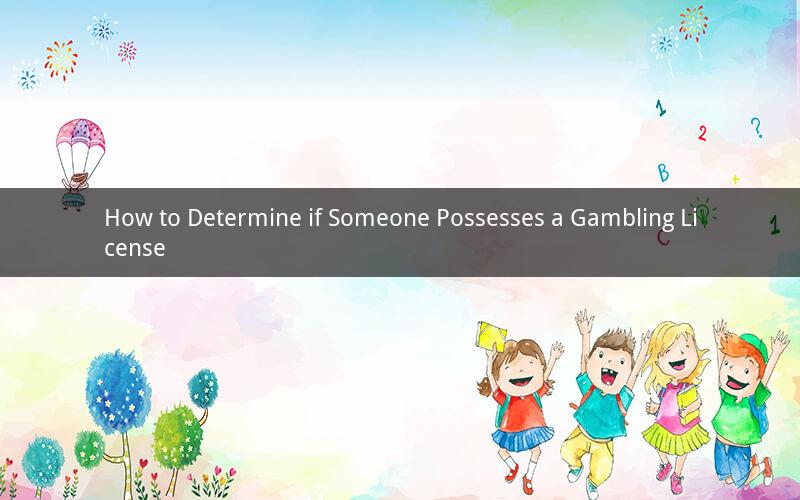
In the bustling world of online gaming and casinos, it is crucial to ensure that operators are licensed and regulated. This is not only to protect players' interests but also to ensure fair play and prevent illegal activities. If you are seeking to ascertain whether an individual or an entity holds a gambling license, this guide will provide you with the necessary steps to verify their status. Let's dive into the process of finding out if someone has a gambling license.
1. Conduct a Background Check
The first step in determining if someone possesses a gambling license is to conduct a thorough background check. Begin by researching the person or company's name using search engines and social media platforms. Look for any information related to their business operations, partnerships, and previous legal issues.
2. Verify License Issuing Authority
Gambling licenses are issued by government bodies or regulatory authorities. To determine if someone has a valid gambling license, you need to identify the licensing authority responsible for their jurisdiction. Common licensing authorities include the UK Gambling Commission, the Malta Gaming Authority, the Gibraltar Regulatory Authority, and the Kahnawake Gaming Commission, among others.
3. Check the Licensing Authority's Website
Once you have identified the licensing authority, visit their official website. These websites often have a license lookup feature, where you can enter the license number or the entity's name to check if they hold a valid gambling license. If the licensing authority's website does not have a license lookup feature, you can contact their customer support for assistance.
4. Examine the License Details
Upon finding the gambling license, carefully examine the details to ensure its validity. Pay attention to the following aspects:
- License Number: The license number is unique to each operator and should be visible on their official website, marketing materials, and communication channels.
- License Expiry Date: Check the expiry date of the license to ensure it is still valid. A license that has expired is no longer considered valid.
- License Conditions: Review the conditions attached to the license, such as the types of gambling activities permitted, geographical restrictions, and responsible gambling measures.
5. Cross-Check with Third-Party Sources
To ensure accuracy, cross-check the gambling license information with third-party sources. This can include gambling forums, industry watchdogs, and other regulatory bodies. Look for any red flags or warnings regarding the operator's reputation and compliance with gambling laws.
6. Consult with Legal Experts
If you are uncertain about the validity of a gambling license or require further clarification, it is advisable to consult with legal experts specializing in gambling laws. They can provide you with professional advice and help you navigate through the complexities of gambling regulations.
Commonly Asked Questions about Gambling Licenses
1. What is a gambling license, and why is it important?
A gambling license is a permit issued by a government or regulatory authority, authorizing an individual or entity to conduct gambling activities. It ensures that operators adhere to strict regulations, protecting players' interests and maintaining fair play.
2. Can I obtain a gambling license myself?
No, obtaining a gambling license requires compliance with various regulations and procedures set by the licensing authority. It is a complex process that often requires legal expertise and financial investment.
3. How long is a gambling license valid?
The validity period of a gambling license varies depending on the licensing authority and the jurisdiction. Some licenses are valid for five years, while others may be valid indefinitely, provided the operator maintains compliance with the licensing conditions.
4. Can a gambling license be revoked?
Yes, a gambling license can be revoked if the operator violates the licensing conditions, fails to comply with regulations, or engages in illegal activities. Revocation of a license can lead to legal consequences and financial penalties.
5. What should I do if I suspect someone of operating without a gambling license?
If you suspect someone of operating without a gambling license, report the matter to the relevant licensing authority. They can investigate the case and take appropriate action against the operator.
In conclusion, determining whether someone possesses a gambling license requires thorough research and verification. By following the steps outlined in this guide, you can ensure that operators are licensed and regulated, thereby protecting your interests and promoting a fair and responsible gambling environment.